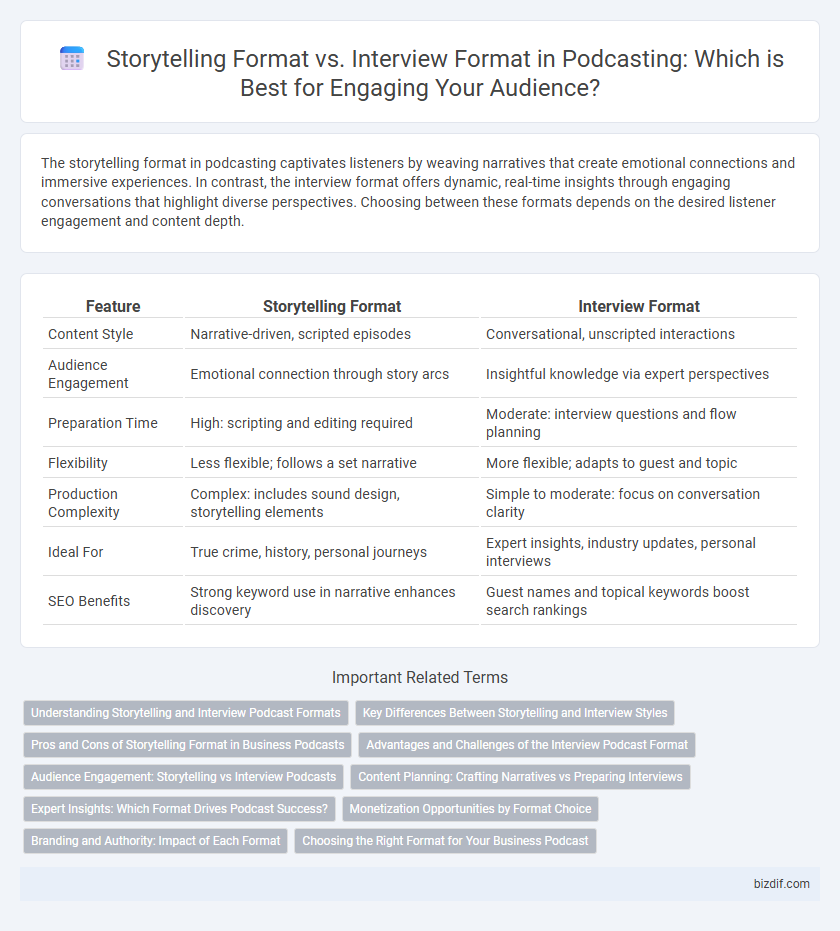The storytelling format in podcasting captivates listeners by weaving narratives that create emotional connections and immersive experiences. In contrast, the interview format offers dynamic, real-time insights through engaging conversations that highlight diverse perspectives. Choosing between these formats depends on the desired listener engagement and content depth.
Table of Comparison
| Feature | Storytelling Format | Interview Format |
|---|---|---|
| Content Style | Narrative-driven, scripted episodes | Conversational, unscripted interactions |
| Audience Engagement | Emotional connection through story arcs | Insightful knowledge via expert perspectives |
| Preparation Time | High: scripting and editing required | Moderate: interview questions and flow planning |
| Flexibility | Less flexible; follows a set narrative | More flexible; adapts to guest and topic |
| Production Complexity | Complex: includes sound design, storytelling elements | Simple to moderate: focus on conversation clarity |
| Ideal For | True crime, history, personal journeys | Expert insights, industry updates, personal interviews |
| SEO Benefits | Strong keyword use in narrative enhances discovery | Guest names and topical keywords boost search rankings |
Understanding Storytelling and Interview Podcast Formats
Storytelling podcast formats immerse listeners in a narrative structure that emphasizes character development, plot progression, and emotional engagement, often creating a cinematic audio experience. Interview podcast formats center on conversational exchanges between a host and guest, highlighting personal insights, expertise, and spontaneous dialogue that enrich the content with diverse perspectives. Understanding these formats enables podcasters to strategically choose structure based on content goals, audience preferences, and desired listener engagement.
Key Differences Between Storytelling and Interview Styles
Storytelling format in podcasting centers on a scripted narrative, emphasizing plot development, character arcs, and immersive audio elements to engage listeners emotionally. Interview format relies on spontaneous dialogue between host and guest, highlighting personal insights, expert opinions, and dynamic interactions for authenticity and real-time engagement. Key differences include structure control, emotional depth, and audience connection, with storytelling offering curated experiences and interviews providing conversational transparency.
Pros and Cons of Storytelling Format in Business Podcasts
Storytelling format in business podcasts excels at creating emotional connections and enhancing listener engagement by delivering narratives that illustrate brand values and customer experiences. It can be less structured than interview formats, which may challenge maintaining a consistent flow or covering specific topics comprehensively. This format is ideal for building brand identity but may require more production effort and narrative skill to effectively convey complex business insights.
Advantages and Challenges of the Interview Podcast Format
The interview podcast format offers the advantage of dynamic conversations and diverse perspectives, which can attract a broad audience and create engaging content through real-time interaction. However, challenges include managing unpredictable dialogue, ensuring guest availability, and maintaining consistent quality across episodes. Effective preparation and skilled moderation are essential to balance spontaneity with coherence and listener engagement.
Audience Engagement: Storytelling vs Interview Podcasts
Storytelling podcasts captivate audiences by weaving immersive narratives that evoke emotional connections and sustained listener attention. Interview podcasts engage listeners through dynamic, unscripted conversations that offer diverse perspectives and authentic interactions. Both formats enhance audience engagement by leveraging unique strengths: storytelling creates emotional resonance, while interviews foster relatability and spontaneity.
Content Planning: Crafting Narratives vs Preparing Interviews
Storytelling format in podcasting emphasizes crafting compelling narratives with structured plot arcs and character development to engage listeners emotionally and maintain flow. Interview format centers on preparing insightful questions and research to elicit authentic responses, fostering dynamic conversations that reveal expert perspectives. Effective content planning involves aligning format choice with audience expectations and episode goals for maximum impact.
Expert Insights: Which Format Drives Podcast Success?
Expert insights reveal that storytelling format in podcasts fosters deeper emotional engagement and narrative immersion, enhancing listener retention and loyalty. Conversely, interview format excels in delivering diverse expert perspectives, credibility, and dynamic conversations that attract niche audiences. Success in podcasting hinges on aligning content goals with audience preferences, leveraging storytelling for impact or interviews for authoritative insights.
Monetization Opportunities by Format Choice
Storytelling formats in podcasting often attract dedicated audiences through compelling narratives, enabling creators to monetize via sponsorships, branded content, and premium episode sales. Interview formats facilitate diverse guest appearances, expanding reach and driving monetization through cross-promotion, affiliate marketing, and live event opportunities. Choosing a format strategically impacts revenue streams by aligning content style with advertiser preferences and audience engagement patterns.
Branding and Authority: Impact of Each Format
Storytelling format in podcasting enhances branding by creating emotional connections and memorable narratives that foster listener loyalty and strengthen brand identity. Interview format builds authority by showcasing expert guests, diverse perspectives, and in-depth discussions, positioning the host as a knowledgeable industry leader. Combining both formats strategically amplifies credibility while maintaining a compelling and relatable brand presence.
Choosing the Right Format for Your Business Podcast
Choosing the right format for your business podcast depends on your goals and audience engagement. The storytelling format excels at building emotional connections and driving brand loyalty through narrative-driven content, while the interview format leverages expert insights and networking opportunities to enhance credibility and deliver diverse perspectives. Evaluating your content strategy and listener preferences ensures the selected format aligns with your brand's vision and maximizes podcast impact.
Storytelling Format vs Interview Format Infographic

 bizdif.com
bizdif.com